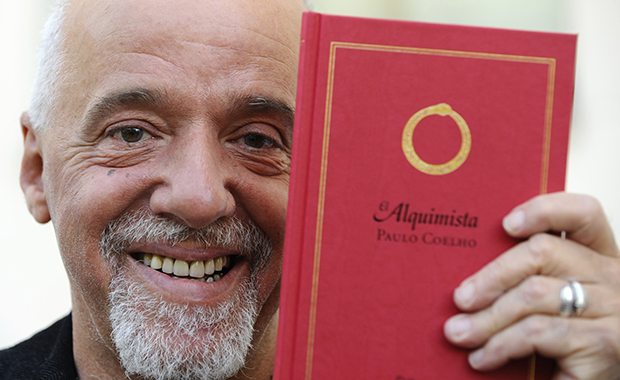Life
Paulo Coelho’s 4 Tips for Becoming Wildly Successful in Life

If you ever wished you could peer inside the mind of one of the most intriguing icons in the world and find out exactly what makes them successful, here’s your chance. Paulo Coelho has written some of the most popular and inspiring novels of the 21st century, touching the hearts of more than 100 million people in 56 different countries.
The Alchemist — Coelho’s most famous novel — has sold over 150 million copies, becoming one of the history’s best-selling books and setting the Guinness World Record for most translated book by a living author. With these facts in mind, it’s clear that Coelho knows a few things about success.
Here are Paulo Coelho’s 4 tips for becoming wildly successful in life:
1. Remember your dreams and fight for them
According to Coelho, successful people must overcome fear and follow their dreams. When referring to the fear of failure, Coelho adds, “Tell your heart that the fear of suffering is worse than the suffering itself. And no heart has ever suffered when it goes in search of its dream.”
When I was in high-school, I dreamed of becoming a professional skateboarder; I genuinely loved that sport. I remember waking up every day with excitement, waiting for the moment I could get on my skateboard and feel the wheels under my feet and the air brushing my hair, but my dad massacred that dream without prejudice.
If I remember well, he said: “Only 1% of skateboarders are lucky enough to make a living from skateboarding, and you aren’t that lucky. Better get yourself a college degree and do something with your life.”
Sadly, I believed my dad’s words. I was so afraid of failing or disappointing my parents, that I quit my dream. I listened to my inner demons instead of my heart, which was a costly mistake. To be fair, I don’t know for sure whether or not I could have been a professional skateboarder, but it’s something I’ll never know.
The bottom line? When fear seizes your soul, and you think you’re not good enough, when no one else believes in you, remember your dreams and fight for them. You have what it takes to handle whatever life throws at you.
“Everyone seems to have a clear idea of how other people should lead their lives, but none about his or her own.” – Paulo Coelho
2. You drown not by falling into a river, but by staying submerged in it
If you can know only one thing about Coelho, it should be that he never regrets for the “wrong” decisions he made or the painful times he went through. He says: “I don’t regret my painful times, I bare my scars as if they were medals. I know that freedom has a high price, as high as that of slavery; the only difference is that you pay with pleasure and a smile, even when that smile dimmed by tears.”
This is a crucial life lesson. Like Coelho, I believe that we learn more from our failures than from our successes. So the next time you bring back one of those unpleasant memories, rather than feeling sad, try to dig out a good lesson from that experience and move on.
Many of us spend our lives feeling guilty and regretting what we did (or did not) in the past instead of focusing on the things we can do right now. That’s a huge waste of time. Let the past stay in the past, and remember that you drown not by falling into a river, but by staying submerged in it.
3. Don’t be intimidated by other people’s opinion
So we know that successful people always follow their dreams, right? And if you follow a dream, you need to have a willingness to endure the criticism and rejection, especially when it comes from people you care about. It’s staggering how many of us will give up on a dream just because someone tells us we can’t. The truth is until you follow your heart instead of other people’s opinions, you’ll never get ahead in life.
Now, don’t get me wrong. I’m not saying you should be rude or disrespectful to others, but there’s a fine line between constructive criticism and just criticism. The key lies in differentiating both.
“People are capable, at any time in their lives, of doing what they dream of.” – Paulo Coelho
4. Be brave. Take risks. Nothing can substitute experience
I love this quote from Coelho: “You have to take risks. We will only understand the miracle of life fully when we allow the unexpected to happen.”
The primary reason most people fail in life is not a lack of talent or opportunities or education, but a refusal to move from their comfort zone and take significant risks. They aren’t brave enough to challenge their boss and ask for a raise, or to quit their job to start a business, or to follow a wild dream. They’re asleep, while their life is passing them by.
But you’re going to be different, right? You’re going to be brave. You’re going to take risks. You’re going to commit to fighting for your dreams and never give up. Because it’s the only way to witnessing the miracle of life.
Check out our motivational Paul Coelho video below:
Have you read ‘The Alchemist’ or any of Paulo Coelho’s books? What did you think? Please leave your thoughts below!
Did You Know
How Skilled Migrants Are Building Successful Careers After Moving Countries
Behind every successful skilled migrant career is a mix of resilience, strategy, and navigating systems built for locals.

Moving to a new country for work is exciting, but it can also be unnerving. Skilled migrants leave behind familiar systems, networks, and support to pursue better job opportunities and a better future for their families. (more…)
Life
10 Research-Backed Steps to Create Real Change This New Year
This New Year could finally be the one where you break old patterns and create real, lasting change.

Every New Year, we make plans and set goals, but often repeat old patterns. (more…)
Life
9 Harsh Truths Every Young Man Must Face to Succeed in the Modern World
Before chasing success, every young man needs to face these 9 brutal realities shaping masculinity in the modern world.

Many young men today quietly battle depression, loneliness, and a sense of confusion about who they’re meant to be.
Some blame the lack of deep friendships or romantic relationships. Others feel lost in a digital world that often labels traditional masculinity as “toxic.”
But the truth is this: becoming a man in the modern age takes more than just surviving. It takes resilience, direction, and a willingness to grow even when no one’s watching.
Success doesn’t arrive by accident or luck. It’s built on discipline, sacrifice, and consistency.
Here are 9 harsh truths every young man should know if he wants to thrive, not just survive, in the digital age.
1. Never Use Your Illness as an Excuse
As Dr. Jordan B. Peterson often says, successful people don’t complain; they act.
Your illness, hardship, or struggle shouldn’t define your limits; it should define your motivation. Rest when you must, but always get back up and keep building your dreams. Motivation doesn’t appear magically. It comes after you take action.
Here are five key lessons I’ve learned from Dr. Peterson:
-
Learn to write clearly; clarity of thought makes you dangerous.
-
Read quality literature in your free time.
-
Nurture a strong relationship with your family.
-
Share your ideas publicly; your voice matters.
-
Become a “monster”, powerful, but disciplined enough to control it.
The best leaders and thinkers are grounded. They welcome criticism, adapt quickly, and keep moving forward no matter what.
2. You Can’t Please Everyone And That’s Okay
You don’t need a crowd of people to feel fulfilled. You need a few friends who genuinely accept you for who you are.
If your circle doesn’t bring out your best, it’s okay to walk away. Solitude can be a powerful teacher. It gives you space to understand what you truly want from life. Remember, successful men aren’t people-pleasers; they’re purpose-driven.
3. You Can Control the Process, Not the Outcome
Especially in creative work, writing, business, or content creation, you control effort, not results.
You might publish two articles a day, but you can’t dictate which one will go viral. Focus on mastery, not metrics. Many great writers toiled for years in obscurity before anyone noticed them. Rejection, criticism, and indifference are all part of the path.
The best creators focus on storytelling, not applause.
4. Rejection Is Never Personal
Rejection doesn’t mean you’re unworthy. It simply means your offer, idea, or timing didn’t align.
Every successful person has faced rejection repeatedly. What separates them is persistence and perspective. They see rejection as feedback, not failure. The faster you learn that truth, the faster you’ll grow.
5. Women Value Comfort and Security
Understanding women requires maturity and empathy.
Through books, lectures, and personal growth, I’ve learned that most women desire a man who is grounded, intelligent, confident, emotionally stable, and consistent. Some want humor, others intellect, but nearly all want to feel safe and supported.
Instead of chasing attention, work on self-improvement. Build competence and confidence, and the rest will follow naturally.
6. There’s No Such Thing as Failure, Only Lessons
A powerful lesson from Neuro-Linguistic Programming: failure only exists when you stop trying.
Every mistake brings data. Every setback builds wisdom. The most successful men aren’t fearless. They’ve simply learned to act despite fear.
Be proud of your scars. They’re proof you were brave enough to try.
7. Public Speaking Is an Art Form
Public speaking is one of the most valuable and underrated skills a man can master.
It’s not about perfection; it’s about connection. The best speakers tell stories, inspire confidence, and make people feel seen. They research deeply, speak honestly, and practice relentlessly.
If you can speak well, you can lead, sell, teach, and inspire. Start small, practice at work, in class, or even in front of a mirror, and watch your confidence skyrocket.
8. Teaching Is Leadership in Disguise
Great teachers are not just knowledgeable. They’re brave, compassionate, and disciplined.
Teaching forces you to articulate what you know, and in doing so, you master it at a deeper level. Whether you’re mentoring a peer, leading a team, or sharing insights online, teaching refines your purpose.
Lifelong learners become lifelong leaders.
9. Study Human Nature to Achieve Your Dreams
One of the toughest lessons to accept: most people are self-interested.
That’s not cynicism, it’s human nature. Understanding this helps you navigate relationships, business, and communication more effectively.
Everyone has a darker side, but successful people learn to channel theirs productively into discipline, creativity, and drive.
Psychology isn’t just theory; it’s a toolkit. Learn how people think, act, and decide, and you’ll know how to lead them, influence them, and even understand yourself better.
Final Thoughts
The digital age offers endless opportunities, but only to those who are willing to take responsibility, confront discomfort, and keep improving.
Becoming a man today means embracing the hard truths most avoid.
Because at the end of the day, success isn’t about luck. It’s about who you become when life tests you the most.
Change Your Mindset
The Four Types of Happiness: Which One Are You Living In?
Most people chase success only to find emptiness, this model reveals why true happiness lies somewhere else.

In a world driven by rapid technological growth and constant competition, many people unknowingly trade joy for achievement. (more…)
-

 News2 weeks ago
News2 weeks agoBrandon Willington Builds 7-Figure Business by Ignoring Almost Everything
-

 Health & Fitness3 weeks ago
Health & Fitness3 weeks agoWhat Minimalism Actually Means for Your Wellness Choices
-

 Did You Know3 weeks ago
Did You Know3 weeks agoWhy Most Online Courses Fail and How to Fix Them
-

 Business3 weeks ago
Business3 weeks agoIf Your Business Internet Keeps Letting You Down, Read This
-

 Business1 week ago
Business1 week agoEntrepreneur’s Guide to Pay Stubs: Why Freelancers and Small Business Owners Need a Smart Generator
-

 Business7 days ago
Business7 days agoThe Salary Shift Giving UK Employers An Unexpected Edge
-

 Business1 week ago
Business1 week agoThe Simple Security Stack Every Online Business Needs
-

 Scale Your Business1 week ago
Scale Your Business1 week ago5 Real Ways to Grow Your User Base Fast





























11 Comments